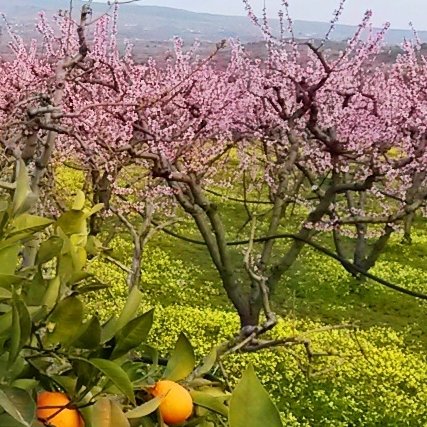Biodiversity and Agriculture in the Etna Region
for the protection of the Sicilian wildcat and other species
In this project we demonstrate sustainable and socio-economically compatible ways of integrating nature conservation into agriculture.
News
In the course of the reorientation of the Common Agricultural Policy (CAP) in 2020, we conducted a survey in our project region around Mount Etna together with NABU, LIPU and the University of Catania on the ecological and socio-economic situation and demands of small farmers working close to nature. Their final analysis and an accompanying letter from the University of Catania , which was sent to the Region of Sicily, among others, find recognition in new, more ecologically oriented support programmes (PSR Sicilia). All project documents: Farming in Sicily's Lands of Biosphere - Terre della Biosfera (terrebiosfera.org).
Background
The project area extends in a semicircle around the northern part of Mount Etna to the southern part of the Nebrodi Mountains. Between these two protected areas we can find many small-scale, partly traditional farming practices, which are typical of the Etna region. The special structural diversity is characteristically for the small farms. Thus, they provide habitat for a wide range of biodiversity and are used, for example, as a migration corridor by the endangered Sicilian Wild Cat.
Initiated by Manfred-Hermsen-Stiftung, the association "Le Piccole Terre" was established by several small farms, which are located on the hillsides or near Mount Etna. They cultivate high-quality organic olive oil, taking into account nature conservation criteria.
The project
Our project aims among other things to protect this valuable habitat as crucial corridor for the wildcat between the protected habitats. In order to achieve the best protection, new approaches in agriculture – the more organic the better -, integrating the conservation of biodiversity as an obligatory objective in the management of the farm, have been promoted. This includes accepting protected wild animals, which is not taken as granted in Sicily.
Besides preserving existing refuges on the farming area, additional measures to increase biodiversity, such as wild areas, flower strips, stone walls, etc., are promoted in field studies and discussed with farmers.
The project started in 2010 with the development of criteria for nature conservation. „Le Piccole Terre“ distributes different first-class organic Olive Oils of the partner farms not only guaranteeing best quality standards but also accounting for enhancing nature conservation.
Our project partner, the Leibniz University Hannover is supporting the project with field studies and student courses, and drawing recommendations for conserving biodiversity in Sicily. The results of the studies also serve the development of generally applicable criteria for nature conservation in agricultural habitats.
Another partner is Giacche Verdi Bronte. Together with Manfred Hermsen-Stiftung Giacche Verdi offers young German volunteers to participate in a voluntary programme on Sicily that includes working in this project. Our volunteer programme allows the volunteers to contribute to the implementation of conservation measures.
A common interest of all parties is to meet the following project objectives:
- Protection of small farms and habitat structures within and between the Etna Natural Park and the mountains of Nebrodi and Madonie
- Promoting high-quality, regional agricultral products
- Environmental education and awareness for nature conservation
- Improvement of nature protection in rural areas
- Integration of nature conservation measures in agricultural practices
- Promotion of ecological, sustainable and natural farming methods in terms of: biodiversity protection / quality and health
More information can be found here:
Man and Biosphere in the Etna region - Overview
Interest group "Le Piccole Terre ": www.bio-divers.org
Leibniz University Hannover www.uni-hannover.de
Unser voluntary programme in Sicily

This project was supported by volunteers of the European Voluntary Service.

